We run regular Q&As throughout the year, where you can meet us to ask any questions you have. Visit our events page to see when the next one is.

Transition support
For young people moving from children’s services into adult services, this time can often feel scary, challenging and confusing. Our Transition team can help families navigate these changes. Our transition service is available to young people aged 14-21, and their families, who are already supported by Shooting Star Children's Hospices. You can download the slides from our most recent Q&A below.
Download slides
Support and resources
Useful resources
There is a wide range of resources available to support young people and their families about transitioning to adult services. A helpful overview can be found on the Together For Short Lives website.
We can answer questions you may have
What transition means for you as a young person or a parent/carer
What legal changes happen when a young person reaches 16 and 18 years of age
What changes may happen to the current care package being provided
How you can find out more about what support is available from adult services
Who can support you and your family to navigate transitioning into adult services
Transition Timescales
- Age 14
- Age 15
- Age 16
- Age 17
- Age 18
- Age 19-21
Age 14
- Transition to adulthood planning starts
- Education – Education, Health, Care and Support Plans (EHCP) will be updated to start to consider the young person’s future wishes and needs. Where possible representatives from Education, Health and Social should be involved in attending EHCP meetings to help future planning.
- Social Care – From 14 years of age young people identified as needing support with the transition into adulthood begin to be highlighted by children’s services to adult social care or a social care transition team.
- Health – Young people identified as likely to be eligible for ongoing health support (packages of care) start to be highlighted to the Adult Continuing Healthcare Team (CHC). People aged 14 and over who have been assessed as having moderate, severe or profound learning disabilities, or people with a mild learning disability who have other complex health needs, are entitled to a free annual health check called a ‘learning disability health check’ which can be arranged through their GP practice.
- Health – From the age of 14 young people, may start to be involved in discussions around Advance Care Planning in relation to their health needs. This is based on the individual needs and understanding of the young person and is done in partnership with the parents/carers.
- Hospice – From the age of 14, young people and their families accessing Shooting Star will be contacted by the Hospice Transition Team and invited to Transition events and offered support. From 14 years of age professional discussions with adult hospice provisions may start to take place to explore eligibility for services once the young person turns 18 years of age.
Age 15
- Education – Yearly EHCP meeting held. Next steps for education, including post 16 education provision and employability explored. EHCP updated.
- Health – Discussions around transfer of care from paediatric to adult health services often begins. This is dependent on a number of factors and is based on the individual needs of the young people
Age 16
- Education – EHCP meetings explore next steps for education, employability and EHCP updated.
- Social Care – If a young person is known to a Local Authority Transition Team, A Care Act Assessment maybe completed at any stage between now and when the young person turns 18. This will look at the young person’s eligibility to receive adult social care services. This can lead to the development of a care and support plan. Discussions between Social Care and the CHC often take place to agree who will fund packages of care.
- Legal -From 16 years of age, The Mental Capacity Act 2005 states that a young person should be ‘assumed to be competent to make their own decisions’, around all aspects of their lives, including their health. This means that their views should be sought by all professionals working with them.
- Health – Between the ages of 16-17, the CHC should start to identify if a young person is eligible for adult CHC funded care and if appropriate a care and support plan should be developed in relation to the care package for the young person when they turn 18. A CHC funded care package from children’s CHC does not automatically mean that adult CHC funding will be agreed.
- Health- Transition from paediatric health services to adult specialist consultants continues.
- Finance – At 16 a young person can claim personal independence payment (PIP) which replaces Disability Living Allowance (DLA). They can be responsible for their own personal budgets and direct payments. If the young person lacks Mental Capacity the parent/carer can apply to be an ‘appointee’ to manage the young person’s finances. The young person may be able to claim for help with travel costs to hospital appointments.
- Hospice – If a young person aged 16+ receives in-house care from the hospice, a Mental Capacity Assessment is undertaken if it is felt that they lack the mental capacity to consent to a stay at the hospice. We will make contact with families to complete a hospice transition assessment, if families are in agreement.
Age 17
- Education – If in education, yearly EHCP meeting held. Next steps for education, including post 16 education provision and employability explored. EHCP updated.
- Social Care – If not already undertaken a referral will be to adult social care or a transition team for a Care Act Assessment to be undertaken.
Age 18
- Education – If in education, an annual review meeting will explore next steps into education, employment and adulthood. The EHCP will be updated
- Social Care – If identified as meeting criteria for the provision of a care package from social care, this is now likely to be arranged by adult services but a social worker from a transition team or adult social care team maybe allocated. From 18 years, the young person’ personal income is assessed in relation to payment for social care services.
- Social Care – Parents/carers should request a carer’s assessment.
- Legal – The young person is now legally considered to be an adult. If a young person is assessed under the Mental Capacity Act as ‘lacking mental capacity’ to make decisions, legal advice can be sought around applying for a ‘Deputyship Order’ in relation to ‘property and financial affairs and/or personal welfare’.
- Health – Health care appointments should now be transferred to an adult health specialist. The GP will play a central role in the ongoing medical care needs of the young person when they become an adult. CHC funded care package should now transfer to adult CHC.
- Financial – The young person may now be eligible for Universal Credit and other benefits in their own right. If the young person lacks Mental Capacity the parent/carer can apply to be an ‘appointee’ to manage the young person’s finances.
- Hospice – For in house stays in the hospice for young people over 18 years of age, if on completion of a Mental Capacity Assessment it is felt that the young person lacks mental capacity to consent to a stay at the hospice a Deprivation of Liberty Safeguards Referral is made by the hospice to the Local Authority where the young person normally resides (see additional guidance below around Dols).
Age 19-21
- Education – If in education, an annual review meeting will explore next steps into education and employment. The EHCP will be updated. The EHCP can continue until the young person is 25 years old.
- Social care – If required a social worker from a transition or adult social care team is allocated who is responsible for reviewing the social care package of care.
- Health – Health care needs should now be transferred to an adult health specialist.
- Hospice – Currently Shooting Star provides support to young people and their families up until the young person reaches their 21st Birthday. Where appropriate, from the age of 14, the hospice will explore with young people, their families and professionals, transition to adult hospice services or other specialist services.
Transition stories


Talking Transition
We supported Aiden and Sophie as they travelled to the Hospice UK conference in Glasgow to give their views on transition.
Access our transition service
Our transition social worker works closely with teams across Shooting Star Children’s hospices and with external multi professional teams supporting young people and their families including doctors, teachers, nurses and social workers. You can get in touch via email or ask one of the care team to make a referral for you. Please do not hesitate to be in touch with any comments, ideas or feedback as to the support you need.